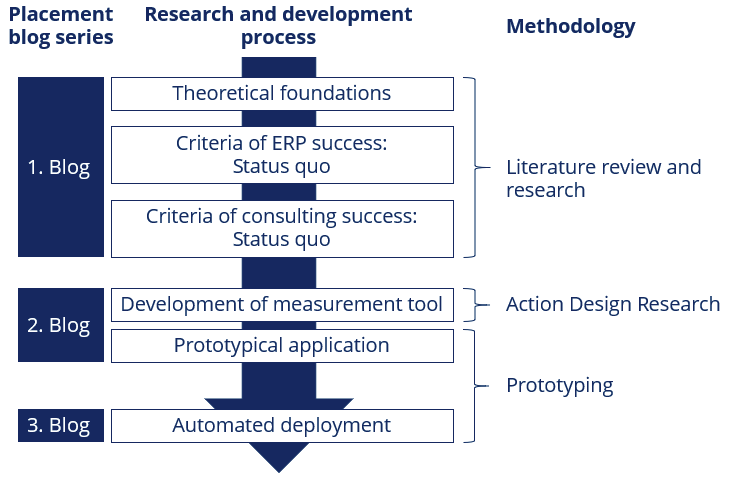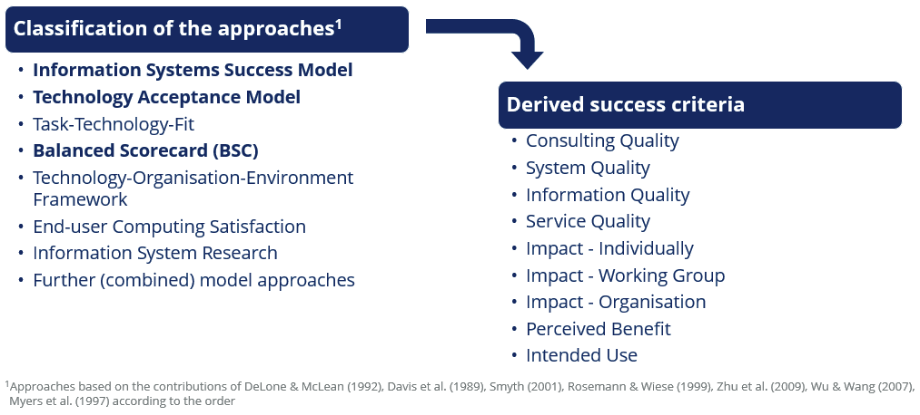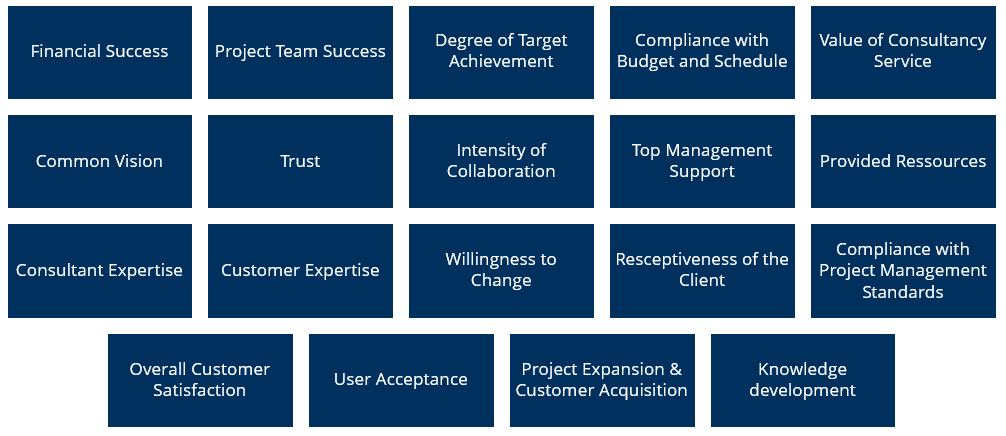The core competence of manaTec GmbH as Odoo Gold Partner is ERP consulting. Here, a wide range of services is covered, from conceptual design to implementation to customizing and accompanying support. The goal is to implement the resulting projects under sensitive coordination of the advantages of the ERP system with the needs of the customers for both sides sustainably to the highest satisfaction.
Due to the constant customer contact, the internal exchange of the ERP developers and consultants among each other as well as the high importance of the image for the continuous acquisition of new as well as attitude of existing customer and consulting projects, it is in the natural interest of a consulting company to establish beside the profitability, in particular also a high customer satisfaction and optimal interhuman conditions in the enterprise itself.
The wish of manaTec GmbH was therefore to find a practicable solution to evaluate completed ERP projects internally from several points of view. For example, a model or measuring instrument for evaluating the individual project success from the consulting perspective for internal evaluation and degree measurement compared to comparable projects was conceivable and considered. In the medium to long term, weaknesses and strengths were to be identified on the basis of the knowledge gained through the evaluation, and the optimization of the service was to be driven forward in the sense of improved competitiveness.
Due to this endeavor and the lack of available dedicated tools for this use case, the opportunity arose in the context of my thesis to develop a solution for this problem on the basis of scientific findings in the form of a proof of concept. Through the cooperation of the TU Dresden with manaTec GmbH, it was finally possible to develop an automated measurement tool via the connection of Odoo as a data source to Power BI as an evaluation tool.
As a link to the blog series Power BI & Odoo based Controlling for consultants from June/July 2020, in which so-called hard factors such as the financial aspect of success (e.g., via billing rates) were already presented, the following series of articles will present a holistic view of project success (including soft factors) by describing the development and application of a corresponding measurement tool.
To this end, this first part of the blog series will now first address the status quo with regard to success measurement from the consulting and customer perspective and the success criteria and significant success models that are incorporated into the development of the model and derived from the literature. The two subsequent blog posts deal with the development of the model and its conceptual implementation in the final result as well as, finally, the automated mapping of this concept via Odoo and Power BI, in connection with the financial success criteria presented in the preceding blog series.

The blog series provides an insight into the development process of an unpublished conceptual model for the evaluation of ERP consulting projects, which has already found its way into practice through its application at manaTec GmbH. In general, the contents also offer starting points for consultancies that are considering evaluating their services internally. In addition, the series of contributions as a kind of case study shows how a successful cooperation of science and practice was implemented on a real project in the course of the development of the measurement instrument. In doing so, the so-called Action Design Research was used as a research method. This aims at the development of so-called IT artifacts in the field of information systems, which in this case is represented by a tool for evaluation. This is realized through the collaboration of research and (business) stakeholders, through a continuous exchange and through practical, iterative interventions to create, optimize and finalize the IT artifact.
Status Quo on research in ERP and ERP consulting.
As mentioned at the beginning, it should be in the natural interest of a consulting company to internally evaluate and sustainably optimize its own projects. That the topic around ERP success and the meaning for the consultation is also subject of the scientific discourse, the following lines are to clarify again, which were taken over in parts from the thesis and are based on most diverse scientific contributions. Finally, it was the relevance for theory and practice that was decisive for the motivation and the start of the development of such a tool for measuring success.
ERP system implementation is generally a mostly complex, time-consuming, and costly undertaking that requires a high degree of expertise and sufficient freely available resources (cf. Wang & Chen, 2006, p. 1029). Therefore, for most companies, resorting to external support from IT consultancies is essential (cf. Ifinedo, 2011, p. 2067). In order to free up resources and give companies the opportunity to focus on their operational business even during the introduction of an ERP system, ERP service providers are therefore indispensable in most cases for handling the introduction and adaptation process.
The scope and complexity of projects still often results in missed deadlines and budgets, false promises or outright project failure. For example, according to a recent Panorama study of 237 companies, only 42% would call their ERP implementation a success (vlg. Panorama Consulting Solutions, 2018, p. 34). In order to better manage projects and counteract failures, approaches to measuring success and, in particular, critical success factors (CSF) have also been investigated in the extensive scientific discussion of ERP systems (cf. Kronbichler, Ostermann, & Staudinger, 2010, p. 282; Lech, 2016, p. 2; Pabst et al., 2016, p. 27). The consideration of these studies focuses mainly on the adapting organization, which, however, is only one of the three parties involved in an ERP project, along with the ERP provider and the ERP consultancy (cf. Kronbichler et al., 2010, p. 303; Lech, 2013b, p. 84, 2016, p. 3; Teo, Singh, & Cooper, 2009, p. 3). A critical examination of performance measurement from other perspectives is underrepresented in the current literature.
Yet the importance of IT consulting in the ERP market is growing with the demand for external support in ERP implementation and is a critical success factor (cf. Ifinedo, Rapp, Ifinedo, & Sundberg, 2010, p. 1139). According to the Lünendonk Study 2018, IT services are experiencing steadily rising revenues and new customer shares, which is particularly true of medium-sized consultancies with above-average growth (cf. Zillmann & Rauch, 2018, p. 7 ff.). The intensifying competition among service providers, new market entrants, and increasing customer demands are putting pressure on consultancies to address the quality of their own services (cf. Treichler, 2019, p. 263).
In order to keep the chance of receiving many follow-up orders high and to remain competitive in the long term, it is in the interests of the consultancy to complete projects successfully for both sides, delivering high service quality (cf. McLachlin, 2000, p. 142 f.). This requires a critical review of the projects, under two-dimensional evaluation of the success from consulting and customer view (see Gable, 1996, p. 1194). In line with the results of the Panorama Study 2018, it should be noted that satisfaction with the service quality of IT consultancies leaves much to be desired and is improving only sluggishly. It would therefore seem sensible to develop a measurement tool that serves to measure success from a consulting perspective, so that problems within ERP projects can be perceived and used as opportunities (cf. Yoon & Suh, 2004, p. 341). This would be particularly interesting if different ERP customer projects could be compared with each other from a consulting perspective and consequently conclusions drawn for future optimization (cf. Kronbichler et al., 2010, p. 303).
The challenge is to provide an up-to-date and complete overview of the state of research through in-depth interdisciplinary research in order to subsequently develop an ERP-specific tool for uncovering strengths and weaknesses in the project business for the long-term generation of competitive advantages from a consulting perspective. The task was therefore first to filter, classify and structure existing approaches to evaluating success from the customer's perspective. Following this, essential success criteria from the consulting perspective are identified, linked with target-oriented success criteria from the customer perspective, and finally a practical measurement instrument is developed based on a starting or framework model to be selected.
Significant success models/criteria and outlook
Based on a comprehensive literature research via scientific databases, it was possible to identify success models and factors that form central elements and criteria for the development process and on which the evaluation is ultimately based. A more in-depth definition of these will not be discussed here in order to keep the scope of the blog within limits. If further information on the approaches shown in the next figure is required, all available information can be found on the web via the sources listed in the appendix. There is a wide range of models for evaluating the success of ERP projects from the customer's point of view, and many relevant factors and categories can already be identified - especially in the areas of technical implementation, consulting quality, acceptance and the benefits of implementation.

Due to the lack of sources explicitly attributable to the ERP environment, research from a consulting perspective was primarily conducted in the management consulting environment. This made it possible to identify corresponding factors, the application of which was then adapted to the environment of ERP projects:

Now you already know some relevant success factors that can be used as a yardstick for a consideration of the project success. However, these offer a wide scope for interpretation and the interplay of these is not yet obvious at first glance. In the next part of this blog series, which focuses on the development and first prototypical application of the measurement tool, you will learn how these factors could be combined and structured in a meaningful way, which model served as a basis for this and how the factors can ultimately be made measurable and calculated.
Are you interested in evaluating your projects internally or are you looking for a business intelligence solution? Contact us now Contact us now and we will be at your side as a reliable partner!